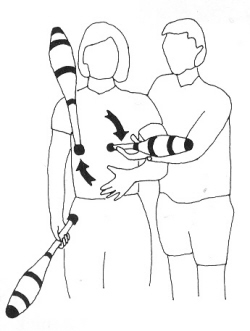|
Juggler's
Workshop by Martin Frost & Mike Stillwell This
time we're going to talk about ways to steal clubs out of solo or
passing patterns, from easy steals to much fancier ones. Some steals,
or takeaways, are done from a side-to-side position, with both
jugglers facing the same direction. Others are done face to face or
from the middle of a passing pattern. Half
Stealing For
starters, try this half-stealing pattern. Stand to the left of your
juggling partner. Moving in very close, reach in with your left hand
and catch a club that's coming to your partner's left hand (see Fig.
1). Catch it higher than normal, before it reaches your partner's
hand. Just before your partner's next left-hand catch, throw your club
under the catching arm and back across to the right hand in a normal
cascade throw.
You've
stolen and returned a club in your partner's pattern. Try stealing and
returning every third club, then every other and finally every club,
all with only your left hand. When you're stealing every club this
way, you and your partner are each half juggling. Now try the same
thing from the right side with your right hand.
While you're half juggling, you have a free hand to do whatever you want. Scratch your head, adjust your hat, put on sunglasses, scratch your partner's head, steal your partner's hat, maybe give it back, etc.
Side
to Side: Slow or Fast Steals There
are two principal modes of stealing: the slow steal and the fast
steal. In the slow steal, you steal with only one hand (say, the left)
although you end up with all the clubs. In the fast steal, you take
clubs alternately with both hands. The fast steal is a little harder
to learn, but once you understand it, it really isn't very difficult.
The slow steal starts just like the half steal above. Move in close to
your partner's left side, reach in
and up with your left hand and catch a club before it gets to your
partner's left hand (Fig.
1). As the next club comes to the left hand, throw your first club to
your right hand and catch the second club in your left. As you do
this, step slightly in front of your partner, maybe pushing a little
to make the steal dramatic.
To
let your partner throw the last club from the right, you should catch
your first club in your right hand with your right arm reaching far to
the right and a little high. Your partner can then throw the last club
under your right arm in normal cascade fashion. You of course catch
the third club in your left hand as you take over all the juggling.
The
fast steal starts the same as the slow steal. Take a club coming to
your partner's left hand with your left hand. But as you do that,
quickly step in front of your partner and reach out immediately with
your right to catch the next club that was going to your partner's
right hand. As in the slow steal, keep your right arm high enough to
let your partner throw the last club under it from the right. You
start throwing to yourself as you catch the third club from your
partner in your left hand. Now you're in front and have all the clubs.
This
steal is twice as fast as the slow takeaway, since you're stealing
with both hands. While you're learning the fast steal, it may be
helpful to have your partner juggle a little slower than usual. Don't
Be Faked Out As
you learn either the slow or the fast steal, and especially while your
partner is learning to have the clubs stolen, avoid accidental faking.
A false move is likely to end up with a club on the floor as your
partner doesn't bother to catch a club you appear to be stealing.
Don't move your arm in for the first steal until you're sure you're
ready. Pick a particular club, watch it go around and when it heads
for the left hand, jump in and start the steal.
On
the other hand, learn not to be faked out. When you're learning to
have your clubs stolen, practice totally ignoring the stealer until
the clubs have been taken. Just
keep your pattern even. The stealer shouldn't require any helpful
throws from you. |
